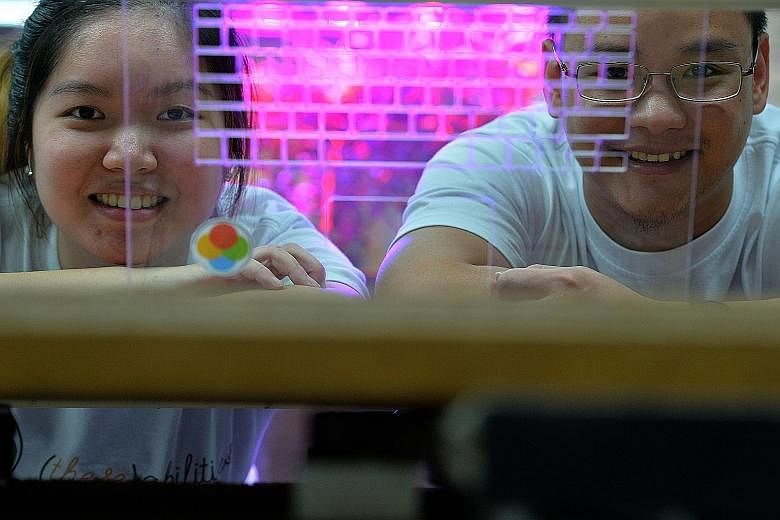More than half the people who are advised to buy a keyguard, so that they can type more easily on keyboards, do not get one.
That was a top issue raised by SPD , which helps people with disabilities, when design and technology start-up (these)abilities approached it in August to better understand issues disabled people face.
The start-up has since found a solution and is designing more items to help people with disabilities.
A keyguard is a plastic or metal plate placed on top of a keyboard, with holes aligned to the keyboard's keys.
It makes the keys recessed, making it easier for people with upper-limb mobility issues - such as those who have suffered strokes or have Parkinson's disease or muscular dystrophy - to use a keyboard.
Many people here do not use keyguards because they are costly or do not fit their keyboards.
There are only about 30 keyboard models worldwide that are compatible with keyguards - mostly models that are outdated or meant for desktop computers.
With a niche consumer market, firms also tend to charge high - an average of $120 - for a keyguard. A Singapore buyer would also have to pay for shipping, as keyguards are usually made abroad.
When the start-up's co-founders Ken Chua, 24, and Christabella Irwanto, 20, learnt of the price, they found it "ridiculous".
They changed the manufacturing process by using a new technology in which the scanned image of a keyboard layout can be sent to a laser cutting facility to cut the plastic according to the layout. This means keyguards can be customised to any keyboard, and costs are halved. (these)abilities also recently set up ordering and delivery systems, and can now take orders here.
SPD e-accessibility manager Ivan Tan said keyguards are crucial as they help improve accessibility to computers or mobile devices for people with disabilities .
He said: "Affordability and convenience are key benefits when a local vendor can provide customised keyguards."
(these)abilities aims to improve accessibility to assistive devices and technology, by designing them in a way that makes it cheap and easy for those who needthem.
Mr Chua said: "Companies usually leverage the fact that the disability consumer market is small and price-inelastic.
"But, as the items are so expensive, people don't buy them."
He and Ms Irwanto met at the Singapore University of Technology and Design (SUTD) last year.
He was a product design and engineering student and has graduated, while she currently studies computer science there.
Though the start-up is only about six months old, the idea for it came about seven years ago.
After Mr Chua volunteered with Cerebral Palsy Alliance Singapore when he was in junior college, he became interested in helping people with disabilities.
"I felt it was social injustice. People are born differently abled, not disabled, but because society has minimal inclusion for such people, it renders them disabled. I found it to be a design problem," he said.
He went to SUTD to acquire the design skills needed, then roped in Ms Irwanto to set up (these)abilities. She agreed as she wanted to contribute to a social cause.
Other projects they have worked on include a product that allows a bus to carry three wheelchair users safely instead of one. This was used by organisers of the Asean Para Games to help ferry more athletes via chartered buses.
The pair have also been organising sessions, attended by people with and without disabilities, to propose design solutions.
(these)abilities was recently selected for a programme which helps start-ups that tackle challenges faced by people with disabilities, and it received seed funding of $10,000 from Singtel earlier this year. Singtel's vice-president of group corporate social responsibility Andrew Buay said: "Their business model focused on simple and cost-effective accessibility solutions for persons with disabilities."
Mr Chua hopes to come up with more products. He said: "It doesn't take rocket science to disable disabilities. It requires only a level of empathy and creativity."
•For more information, go to www.theseabilities.com



